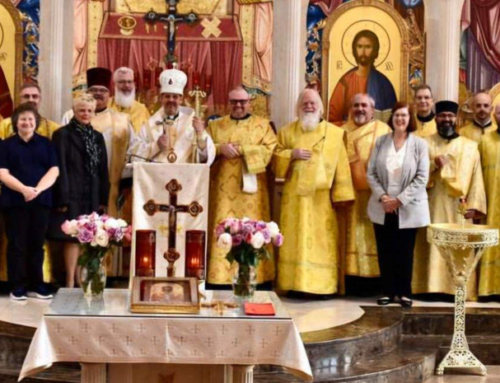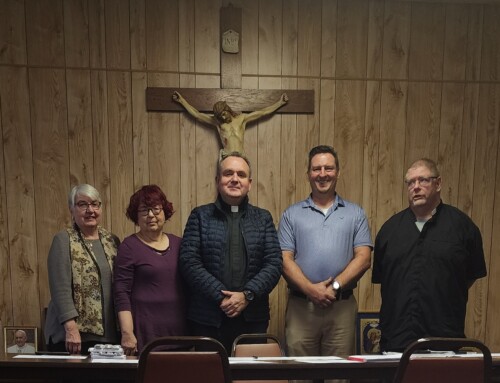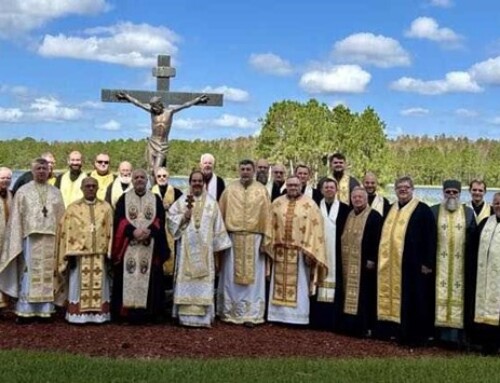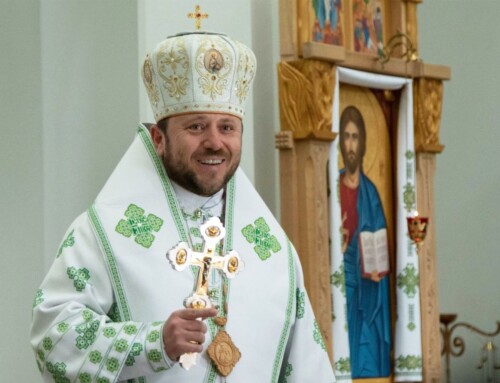The light shines in the darkness,
and the darkness has not overcome it.
-John 1:5
Very Reverend and Reverend Fathers,
Venerable Brothers and Sisters in Monastic and Religious Life,
Dearly Beloved Laity!
The war in Ukraine continues to cause terrible suffering for countless individuals. We see the deep wounds caused by the war’s devastating destruction, maiming injury, and innumerable deaths. Yet, there is another kind of suffering that we tend to not discuss openly: the psychological traumas inflicted by the violence of war and mental health in general. Dr Hans Kluge, head of the World Health Organization’s Europe region. writes about the war in Ukraine, “Almost 10 million people at the present time are potentially at risk of mental disorders such as acute stress, anxiety, depression, substance use, and post-traumatic stress disorder or PTSD.”[1] He goes on to state, “The greatest needs are in areas most severely impacted by the conflict, but populations in relatively safer parts of the country are also affected”. Aid groups say that damage to mental health will be the most devastating legacy of the war in Ukraine.
Furthermore, 14 million people have been uprooted from their homes. Forced displacement is associated with various forms of stress and trauma, which are frequently overlooked and minimized. The psychological distress associated with forced displacement is considered equivalent to the death of a loved one. Emigration radically changes everything: geography, language, culture, circle of friends, the way people interact with one another, and often even one’s profession. Sometimes there are distorted feelings of guilt or shame for being alive and safe while others are dying in Ukraine. Sudden disruptions in social connections can isolate and amplify loneliness. Children are especially vulnerable to traumatic events during displacement and the post-migration stressors they continue to be exposed to. Data suggest that refugee children have much greater mental health needs compared to the general population.[2]
Anxiety, sadness, difficulty sleeping, fatigue, anger and unexplained physical symptoms are all normal reactions to abnormal situations and reflect the nervous system’s response to a heightened state of alertness, or “fight/flight” to protect a person from danger. For most people, these symptoms improve over time if basic needs are met, and they have social support. However, when one experiences repetitive, unpredictable threats to their personhood, the likelihood of developing complex post-traumatic stress disorder (cPTSD) increases.
What can we do? There is no simple answer. Our faith calls us to fellowship, our God calls us to communion. We need to find ways to share our plight with trusted individuals and engage in a supportive community where we can receive help. When we can speak and feel really listened to, then we are on the path toward recovery and healing. Knowing that there is someone who cares can change the life of a person who is suffering. God cares. We are called to care for each other. It is within supportive communities that we can also discover ways to give of ourselves, which also helps us adapt to new circumstances. Like the Good Samaritan in the Gospel, we must be attentive to the needs of others, listen, offer respect, consideration, and love. Jesus’ ministry was one of hope and healing. In imitating Christ, we provide hope and healing to others.
But now thus says the Lord, he who created you, O Jacob,
he who formed you, O Israel:
“Fear not, for I have redeemed you;
I have called you by name, you are mine.
When you pass through the waters I will be with you;
and through the rivers, they shall not overwhelm you;
when you walk through fire you shall not be burned,
and the flame shall not consume you.
-Isaiah 43:1-2
In light of the war in Ukraine and its impact particularly in the global Ukrainian community, we would like to raise awareness regarding mental health. Violence causes trauma and mental illness. Mental illness is a source of deep suffering. Persons with mental illness often suffer in silence, hidden and unrecognized by others. Sometimes the psychological anguish is so great that depression sets in and even despair. A person’s anguish can become unbearable, to the point that they desire to die. Very sadly, in recent months, Ukrainian communities in the USA have seen a number of suicides. Statistics indicate that there are an estimated 8-25 suicide attempts to one death by suicide. No group is exempt from being at risk of suicide. A new crisis support line was recently initiated in the USA. The Lifeline provides 24-hour, confidential support to anyone in suicidal crisis or emotional distress. One can call or text 988 to connect with a trained crisis counselor. This same crisis line offers guidelines to those who become aware of someone who is in serious distress.
Those who lost a loved one to suicide need particular care and attention. Their grief is often complicated by confusion, anger, and guilt. They wonder if they could have done something different to prevent the death of their loved one. They frequently feel alone, as if no one can understand their pain. We must not be afraid to initiate difficult conversations with survivors of suicide. We must help them discuss their profound loss. We need to be available to them in order to facilitate a painful journey toward healing. Additionally, there are survivor support groups such as Alliance of Hope (https://allianceofhope.org/find-support/for-new-survivors/).
To properly understand the Church’s teaching on suicide, we need to recognize that our lives originate in the divine. God is the giver of life. Each of us is wonderfully made in His image and likeness (Genesis 1:27). All human beings, regardless of what ailments they suffer, are made in the image and likeness of God. It is to God, not us, that we owe our lives. As the Catechism of the Catholic Church teaches, “Everyone is responsible for his life before God who has given it to him. We are stewards, not owners, of the life God has entrusted to us. It is not ours to dispose of” (2280). However, the Church also recognizes that grave psychological disturbances, anguish, or grave fear of hardship, suffering, or torture can diminish the responsibility of the one committing suicide” (2282). Mental illness often impairs a person’s thinking and ability to reason. Nonetheless, we must bear in mind that our faith does not promise a life free of suffering. We believe that Christ’s suffering and death on the cross and his resurrection give meaning to our suffering. Our hope lies in the Lord, in whom, through the life of the Church, we receive the spiritual strength to endure.
It is important to also address the stigma associated with mental illness that has been with us for millennia. We need to remember that Christ is present in those who are sick. Pope Saint John Paul II confirmed this when he said, “Christ took all human suffering on himself, even mental illness. Yes, even this affliction, which perhaps seems the most absurd and incomprehensible, configures the sick person to Christ and gives him a share in his redeeming passion.”[3] In this same document, Saint John Paul II reminds us that it is everyone’s duty to respond with active charity to those who suffer from mental illness, particularly because the kingdom of God belongs to them (Mt 5:3). Mental illness is not a moral failure, character defect, weakness of will, nor insufficient faith. It is an illness like any other physical ailment resulting from the consequences of fallen humanity. Those suffering from psychological wounds or psychiatric disorders should not be stigmatized or judged. Links for some helpful mental health resources in English and Ukrainian can be found at this website: https://helpandhope4ukraine.org/
There is an intimate relationship between mind, body, and soul. Research in recent years has significantly increased our knowledge about the brain. Clinicians have a better understanding of how trauma and suffering adversely influence the body and brain. Effective medical treatments and psychological interventions exist to help restore function. However, somatic treatments alone do not heal the person. They are tools that can stabilize physiology and help one learn to evaluate situations from a compassionate and objective perspective. Even though mental illness has biological and medical underpinnings, we have to acknowledge that mental illness also impacts our spiritual life. All suffering can precipitate questions about the meaning of life. Mental health, and healing the whole person, require both a health care and pastoral response. Just as Jesus reached down to Simon Peter and pulled him up from the depths of the sea, Christ reaches down into the depths of our pain and pulls us up from the depths of our cry: “From the depths I call to you, Yahweh: Lord, hear my cry” (Psalm 130:1).
As we continue to pray for the defenders of the innocent, for an end of the aggression against Ukraine, and the ultimate victory of God’s truth and just peace for the martyred people and country, may we also learn to be the conduits that direct God’s healing touch to our suffering brothers and sisters so that their despair may be transformed into hope as the Psalmist exhorts us: “My whole being hopes in the Lord, more than the watchman waits for daybreak” (Psalm 130:6).
Dear Brothers and Sisters, our people have been through humanly created hell before. We have endured untold torment and brutal injustices. Our Church and people have been victims of repeated genocidal waves. We were to be extinguished. And yet we live. The mystery of evil can be devastating. But it can be overcome. Our Lord entered into it fully, completely, personally, and victoriously. Christ opens to us the gates of heaven after death. After His demise the Lord lives and gives life. Today, in a special way we are called to live our resurrectional faith as we apply all the best practices of medicine and psychology. With God’s help we will use these instruments and our new awareness to help each other. That is our hope and that is our common vocation. Let us walk in this pilgrimage together!
The light shines in the darkness, and the darkness has not overcome it.
+Borys Gudziak
Archbishop of Philadelphia
Metropolitan of Ukrainian Catholics in the United States
+Paul Chomnycky, OSBM
Eparch of Stamford
+Venedict Aleksiychuk
Eparch of St. Nicholas in Chicago
+ Bohdan J. Danylo
Eparch of St. Josaphat in Parma
[1] https://twitter.com/hans_kluge?ref_src=twsrc%5Egoogle%7Ctwcamp%5Eserp%7Ctwgr%5Eauthor
[2] https://doi.org/10.1017/S2045796017000695 Published online by Cambridge University Press
[3] https://www.ewtn.com/catholicism/library/mentally-ill-are-also-made-in-gods-image-8863





